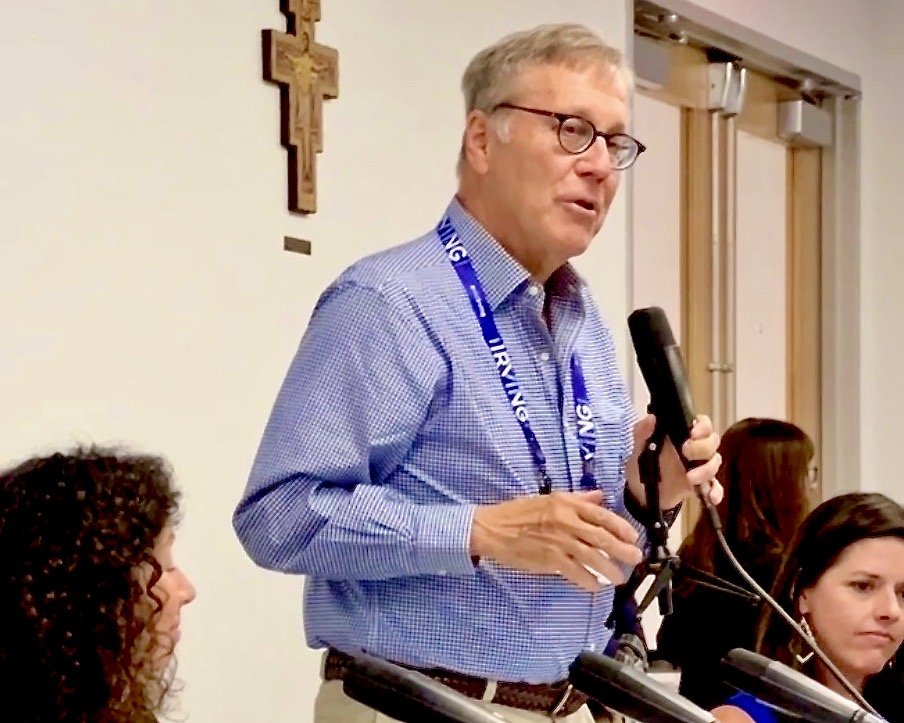December 24: Happy Birthday Dana Gioia
Photo of Dana Gioia from his Twitter account
Dana Gioia, distinguished poet, critic, cultural observer, and Catholic, was born Christmas Eve in 1950. In the midst of an extraordinary career in which he has achieved widespread recognition and active sales of his poetry collections, a rare achievement for living poets, he continues to work towards another kind of success—seeking to bring not only poetry (which is much neglected these days) but also the work of fine Catholic writers back into the mainstream culture.
Dana Gioia’s essay “Can Poetry Matter?” appeared in the Atlantic in 1991 and vividly portrayed the way that poets and poetry have lost their influence in our society. His later essay "The Catholic Writer Today" (First Things 2013) made a strong case for the need for the reintegration of Catholic creative work of the highest quality into the secular mainstream. Fixing the lack described in the latter essay has become a prominent goal of his.
"He has said, repeatedly, that he intends to devote the remainder of his life to the restoration of Catholic artistic and literary culture."—From Coming out as a Catholic poet, by Mike Aquilina at Angelus News.
Gioia achieved the integration of his own writing in the secular mainstream, initially on his own, based on his creative gifts, his drive, his eloquence, plus his having learned from extraordinary poets, and, not incidentally, made the right contacts and established his intellectual credentials by excelling at both Stanford and Harvard. But for a long time, his secular identity and Catholic identity were separate. That bifurcation started to mend some years ago.
In a conversation with Robert Royal of The Catholic Thing, during the first in-person summer session this past year of the online MFA in Creative Writing at the University of St. Thomas Houston, Gioia said that because Royal introduced him to “a round table of deeply traditional Catholics who were intellectually alert, . . . I realized that my tribe that I’d been wandering to find was there. This was my first step, the first step of me in a sense being able to take my literary personality that was entirely in a secular literary world and my spiritual identity and putting them together."
In a subsequent email to me after I sent him the above quote as part of an article I was writing about last October’s Catholic Imagination Conference in Dallas (a conference which he originally founded, more about that later), Gioia expanded on what he had said in Houston,
“I was a Catholic writer who had no cultural context for my identity.. . . I worked in the larger literary culture. My work was not about overtly Catholic subjects. My Catholicism, however, expressed itself in my worldview and aesthetic. I did not want to hide in a subculture. I wanted to engage the art of poetry in the largest sense. I had a profound sense of working alone.
“Robert Royal's invitation came as a surprise, and it gave me a sense that there were others like me. I didn't become a close friend with anyone new, but I knew they were there. That was what was important—their invisible presence in my life.
“For me it was what I needed. I knew I would do my early work alone in the City of Man, but I needed a sense of the City of God.”
The grounding and sustenance he received at that initial gathering with Robert Royal and fellow Catholic writers eventually led to his creation of the now-biannual Catholic Imagination Conference, because he saw the need was great for other literary Catholics like himself. As he once advised younger Catholic poet James Matthew Wilson at one of their initial meetings, "You should not have to work alone."
The CIC has sparked other initiatives that Jessica Hooten Wilson wrote about in an essay about the conference published at First Things: new journals have been established, such as Presence: A Journal of Catholic Poetry, and new Catholic publishers founded, such as Wiseblood Books [founded by Joshua Hren], not to forget the above-mentioned MFA dedicated to the Catholic tradition that was founded by James Matthew Wilson and Joshua Hren at the University of St. Thomas, Houston.
Dana Gioia recites one of his poems at the 2022 Catholic Imagination Conference, flanked by Angela Alaimo O’Donnell and Jessica Hooten Wilson
Keep up the great work, Dana Gioia. Many happy returns of the day.
Prayer at Winter Solstice
By Dana Gioia
Blessed is the road that keeps us homeless.
Blessed is the mountain that blocks our way.
Blessed are hunger and thirst, loneliness and all forms of desire.
Blessed is the labor that exhausts us without end.
Blessed are the night and the darkness that blinds us.
Blessed is the cold that teaches us to feel.
Blessed are the cat, the child, the cricket, and the crow.
Blessed is the hawk devouring the hare.
Blessed are the saint and the sinner who redeem each other.
Blessed are the dead, calm in their perfection.
Blessed is the pain that humbles us.
Blessed is the distance that bars our joy.
Blessed is this shortest day that makes us long for light.
Blessed is the love that in losing we discover.


